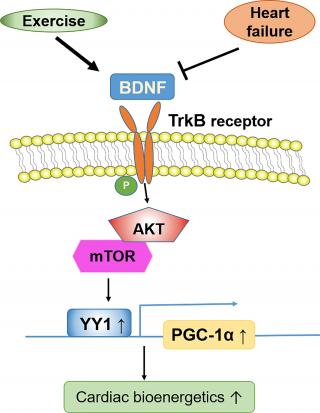Jun, 2022

Brain-derived Neurotrophic Factor (BDNF) is markedly decreased in heart failure patients. Both BDNF and its receptor, Tropomyosin Related Kinase Receptor (TrkB), are expressed in cardiomyocytes, however the role of myocardial BDNF signaling in cardiac pathophysiology is poorly understood. Here we investigated the role of BDNF/TrkB signaling in cardiac stress response to exercise and pathological stress. We found that myocardial BDNF expression was increased in mice with swimming exercise, but decreased in a mouse heart failure model and human failing hearts. Cardiac-specific TrkB knockout (cTrkB KO) mice displayed a blunted adaptive cardiac response to exercise, with attenuated upregulation of transcription factor networks controlling mitochondrial biogenesis/metabolism, including Peroxisome proliferator-activated receptor gamma coactivator 1 alpha (PGC-1α). In response to pathological stress (transaortic constriction, TAC), cTrkB KO mice showed an exacerbated heart failure progression. The downregulation of PGC-1α in cTrkB KO mice exposed to exercise or TAC resulted in decreased cardiac energetics. We further unraveled that BDNF induces PGC-1α upregulation and bioenergetics through a novel signaling pathway, the pleiotropic transcription factor Yin Yang 1 (YY1). Taken together, our findings suggest that myocardial BDNF plays a critical role in regulating cellular energetics in the cardiac stress response.